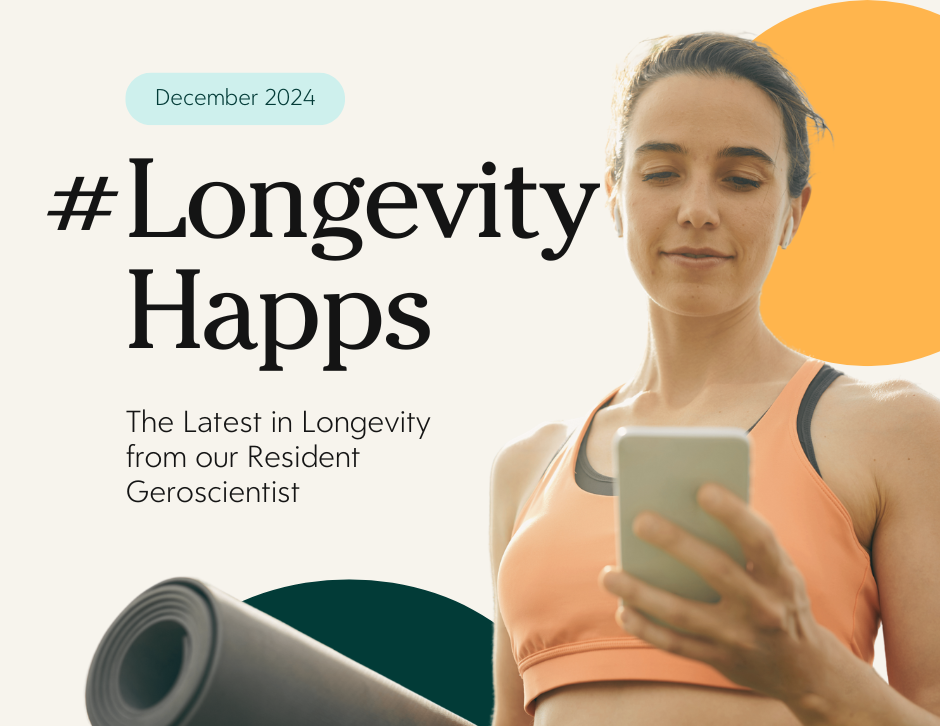
As someone deeply invested in the longevity space, I’m constantly fascinated and empowered by the incredible progress we’re making in understanding how to live healthier, longer lives.
It seems like every week new and exciting research is being published with actionable insights that I can add to my longevity toolkit. Here are a few recent discoveries that I think are too exciting not to share:
1. Could One Drug (GLP-1s) Revolutionize Weight Loss, Addiction Treatment, and Aging?
Imagine a single medication that not only helps with weight loss, but also metabolic health, immune function, cardiovascular health, kidney function, and even brain aging—all while encouraging healthier behavioral patterns by curbing addictive behavior. Longevity scientists may have found just this in GLP-1 medications like Semaglutide.
I’ve been following the research on GLP-1 drugs for the past decade, since the STEP-1 trials put Semaglutide on the map, demonstrating an average 15% weight loss in overweight individuals. Since then the longevity floodgates have opened, with GLP-1 drugs demonstrated to reduce the incidence of cardiovascular disease, multiple cancers, and Alzheimer’s.
This latest article sheds light on an impactful and entirely unexpected effect of GLP-1s, its ability to modulate brain activity to aid in healthy behavioral modification. This article highlights how GLP-1s reduce overdoses by 40% and alcohol intoxication by 50% in patients with substance use disorders. It’s hard to overstate the potential of GLP-1s as a true game-changer in the longevity space.
2. Exciting Developments Uncover How Your Diet May Promote Healthy Immune Aging
One of the most fascinating concepts in nutrition science is the idea that food isn’t just fuel—it’s a conversation with our cells. What we eat influences gene expression, hormone signaling, and even cellular decision-making.
Recent research has highlighted how a carefully balanced diet (including healthy dietary fiber) can optimize this conversation to promote healthy immune aging. And interestingly, so can periods of fasting. It’s an empowering reminder that, despite the challenges of our environment, we can take charge of how our bodies age simply by making thoughtful dietary choices.
3. GLP-1 Drugs May Reduce Your Risk of Alzheimer’s by Up to 70%
The potential benefits of GLP-1s extend far beyond weight loss and addiction treatment. Studies now suggest that these drugs can reduce the risk of Alzheimer’s disease by up to 70% in diabetic patients.
Considering the devastating impact of Alzheimer’s and the lack of effective treatments, this is one of the most promising findings in neurodegenerative disease research I’ve seen recently. It’s an exciting avenue for further exploration and a testament to the power of metabolic interventions in brain health.
4. Niacin May Be a Game-Changer for Longevity and Healthspan
Niacin is one of the most underrated players in longevity science. You can think of Niacin as a critical LEGO piece used to build NAD+, a molecule essential for cellular energy production, mitochondrial health, DNA repair, and over 500 other metabolic reactions that keep our cells running smoothly.
Niacin supplementation has been shown to effectively boost NAD+ levels, and a recent study found that in people 20 and older with heart disease, high dietary niacin intake reduced heart disease-related death by 33% and all-cause mortality by nearly 25%.
Any intervention tied to a substantial reduction in all-cause mortality feels like striking gold in the longevity field—it means shielding yourself from nearly every cause of death, whether it’s age-related disease, injury, infections, and even accidents. That’s a true geroprotective (gero = aging), an intervention that protects the body from the damage of the aging process. Just keep in mind that this was a study based on self-reported dietary data that established correlation not causation, so further research is required to confirm these promising findings.
5. What You Feed Your Kids Today Could Impact Their Health for a Lifetime
For the parents out there, this one is for you. What you feed your kids during their first three years of life has a significant influence on their risk for chronic diseases later in life. Particularly, reduced sugar in their diet had a protective effect on the onset of diseases like type 2 diabetes and hypertension, even when they were exposed to less sugar in utero!
This research is a wake-up call—what seems like a trivial decision today, like the food we pack for our kids’ school lunch each day, can have a profound impact decades down the road. It’s a powerful reminder to prioritize nutritious foods early on, setting the foundation for lifelong health.
6. Can You Balance on One Leg? This Simple Test May Help Predict Healthy Aging
Balance isn’t just a fun party trick—it’s a robust marker of age-related health outcomes. The one-leg balance test, particularly on your non-dominant leg, requires a coordinated effort between your muscles, bones, and nervous system.
A recent study from the Mayo Clinic emphasized its importance as a simple yet powerful clinical test for evaluating how healthy you are aging. If you haven’t tried it, balance on your non-dominant leg for 30 seconds. Want a real challenge? See if you can maintain your balance while closing your eyes—it’s much harder than you think!
The Future of Longevity News
It’s an exciting time to be alive as research within the longevity field is progressing at an unprecedented rate. Every day, we’re learning more about how to optimize our healthspan, extend our lives, and improve our quality of life along the way.
These discoveries remind me just how much potential there is in the longevity field and how many actionable insights we can integrate into our routines today, to age healthy tomorrow. And I’m thrilled to share them with you.
Note: The above statements have not been evaluated by the Food and Drug Administration. This product is not intended to diagnose, treat, cure, or prevent any disease.
